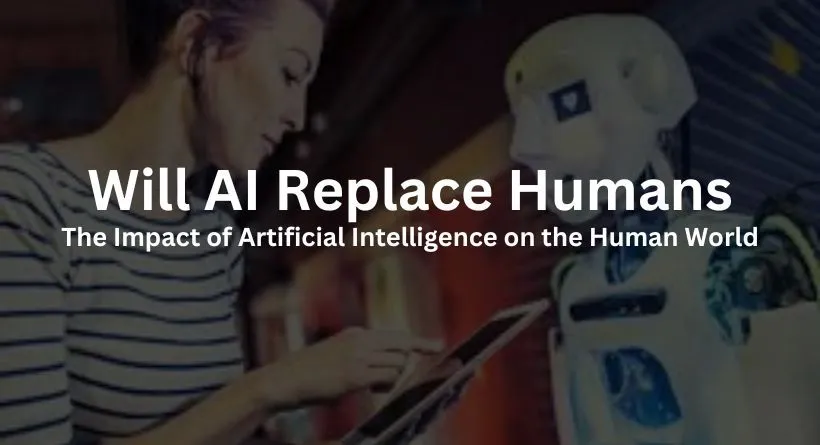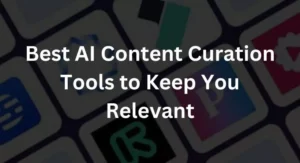
Artificial Intelligence (AI) has been a buzzword for quite some time now, and its influence on our lives is becoming increasingly pervasive. From automating routine tasks to making complex decisions, AI has made its mark in various domains. However, the question that lingers in many minds is whether AI will eventually replace humans. In this article, we’ll delve into the world of AI, its history, current applications, and why it won’t be taking over the world anytime soon.
What Is Artificial Intelligence?

Artificial Intelligence, or AI, is the type of intelligence demonstrated by machines. It’s the ability of a machine, usually a computer, to imitate the processes of the human mind. This includes planning, comprehending, learning from experience, recognizing objects, making decisions, and solving problems. By simulating these abilities, machines can perform tasks that resemble human actions, such as driving vehicles and engaging in conversation. The big question is whether AI will eventually replace humans in various roles.
You may also like reading: Why AI Won’t Replace Humans in the Workplace (And How to Ensure It Doesn’t)
A Short History of Artificial Intelligence
The journey of AI dates back to the Industrial Revolution when humans began outsourcing repetitive, labour-intensive tasks to machines. Over the years, these machines evolved to perform not only physical but also complex cognitive tasks like mathematics and language.
In the late 1950s, AI became an academic discipline, with experts focusing on simulating the human brain, modelling human logic, and imitating behaviour. Fast forward to the 21st century, and the field of AI has become dominated by mathematical and statistical machine learning. This approach has been successful in various industries, including commercial software development.
Examples of AI in Everyday Life
While AI might sound like science fiction, it’s already deeply integrated into our daily lives. You’ve likely encountered AI in the form of a web search engine (think Google), recommendation systems (like those on Netflix), and voice assistants (e.g., Alexa). AI is also behind the wheel of self-driving cars, transforming the way we travel. It’s all around us, and instead of taking things away, AI is creating new possibilities.
Examples of AI in the Customer Service Industry
The World Economic Forum predicts that by 2025, 85 million jobs will be replaced by AI, but 97 million new jobs will emerge. This indicates that as AI technology advances, it will create opportunities for people in areas like design, development, and operation of AI systems.
One industry where AI is making a significant impact is customer service. From handling simple queries to complex complaints, AI-powered chatbots and prompts are helping streamline customer support. They can even delegate complex tasks to human agents, making the workflow more efficient. AI’s ability to analyze vast amounts of data also aids in predicting customer behaviour and solving problems. This complements human efforts rather than replacing them.
How AI Is Beneficial to Humans
AI brings several benefits to humans. It can efficiently imitate and learn from data, work tirelessly without breaks, and perform mathematical calculations with exceptional accuracy. Moreover, AI excels in handling repetitive, routine tasks within a closed internal context, freeing up humans to focus on more creative aspects of their work.
Abilities Unique to Human Intelligence
Despite AI’s prowess, there are certain abilities that remain uniquely human. Imagination, consciousness, intuition, and empathy are among these distinctive qualities. Humans can adapt to changing situations, consider short-term and long-term goals, and think outside the box. These abilities are not easily replicable by machines.
5 Reasons Why AI Won’t Replace Humans

- Emotional Intelligence: AI lacks emotional intelligence. People value personal interactions, where empathy and emotions play a crucial role. Businesses understand that soft skills like communication and relationship-building are vital for fostering connections with customers.
- Creativity: AI, while powerful, can’t match the creativity of humans. With AI automating repetitive tasks, humans can focus on creative endeavours, driving innovation in various fields.
- Relationship Building: Many aspects of life and work rely on relationships. Humans connect with each other, and diverse teams often produce better results. Emotional bonds with colleagues and clients are invaluable, and AI cannot replicate these human connections.
- Empathy: Humans not only experience their own emotions but can empathize with others. This quality is essential in fields like social work, healthcare, and psychology, where building trust is vital.
- Thinking Outside the Box: AI operates within predefined parameters. It can’t analyze complex scenarios, adapt to sudden changes, or develop creative strategies as humans can. Human intuition and adaptability are irreplaceable in many aspects of work.
Will Artificial Intelligence Replace Humans?
While AI continues to advance, it is far from being able to fully replicate human intelligence. AI systems are designed for specific tasks within well-defined contexts. Human creativity, insight, and contextual awareness are essential for making AI work effectively. As of now, AI’s abilities complement human efforts rather than replacing them.
Conclusion
In conclusion, the coexistence of humans and AI is not a competition but a collaboration to create a better world. As technology continues to evolve, it’s exciting to see how AI can enhance our lives, making us more productive and efficient. So, rest assured, AI won’t be replacing humans anytime soon.
FAQs
1. Can AI completely replace human jobs?
No, AI is more likely to complement human jobs rather than completely replace them. It excels in automating repetitive tasks, allowing humans to focus on more creative and strategic aspects of their work.
2. What are some unique abilities of human intelligence that AI can’t replicate?
Human intelligence includes qualities like empathy, creativity, emotional intelligence, and the ability to think outside the box, which AI currently cannot fully emulate.
3. Is AI capable of forming personal connections with humans?
AI can simulate personal interactions to some extent, but it lacks the genuine emotional connection that humans can establish with one another.
4. How can AI benefit humans in their daily lives?
AI benefits humans by automating routine tasks, providing accurate data analysis, and allowing humans to focus on creative and high-priority tasks, ultimately enhancing productivity.
5. What does the future hold for the relationship between humans and AI?
The future likely involves humans and AI working in harmony, with AI enhancing human capabilities and efficiency rather than replacing them entirely.





